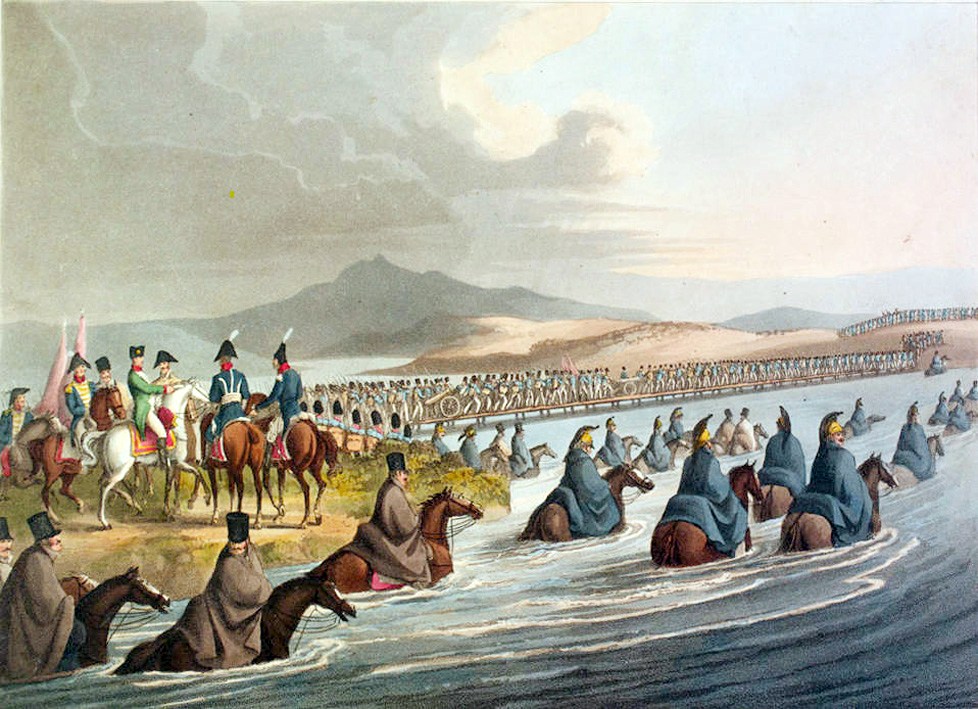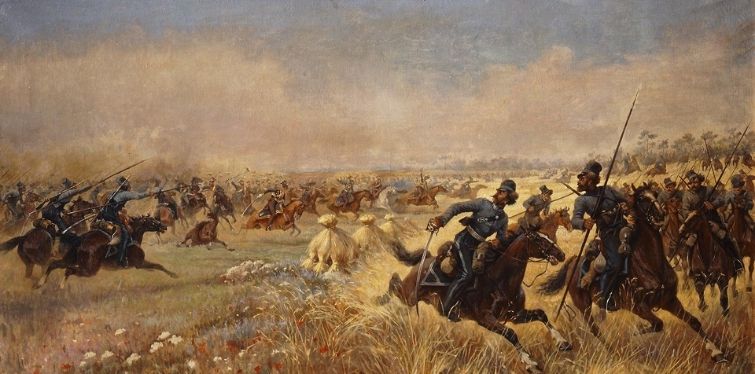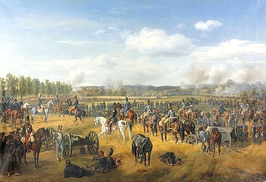This is the long-awaited sixth part of a blog series looking into the experience of Poland during the Revolutionary and Napoleonic Wars. The previous instalment covered the Polish successes and the expansion of the Duchy of Warsaw between 1807 and 1809. This part focuses primarily on the campaign of 1812, the ill-fated invasion of Russia which Napoleon called the ‘Second Polish War’.
In 1810, following victory over Austria the previous year, the prospects of Napoleon and the Duchy of Warsaw seemed brighter than ever. However, this very success increased the vulnerability of the Duchy. Tsar Alexander of Russia was increasingly concerned about the prospect of Napoleon issuing a proclamation of Polish nationhood, perhaps accompanied by an attempt to reclaim the territories taken by the Russian Empire during the partitions. Documents obtained by Russian agents in Paris appeared to confirm such fears.
After failed attempts to renegotiate the Treaty of Tilsit, in December 1810 the Tsar broke his obligations at Tilsit to observe the Continental Blockade and allowed British ships to enter Russian ports under neutral flags. Anticipating the outbreak of hostilities, in 1811 the Tsar asked his old friend Prince Czartoryski to approach his cousin Prince Poniatowski offering the restoration of a Polish kingdom under Russian sponsorship. This was effectively the same plan that had been mooted in 1805, but the political circumstances had changed. Poniatowski refused and informed Napoleon of Czartoryski’s approach. The drumbeat of war was getting louder.
In 1811 Napoleon ordered Poniatowski to prepare a Polish army to take part in the imminent war against Russia. He managed to raise an army of 100,000 men, a remarkable achievement in the context of his uncle King Stanislaw’s struggles to form an army half this number in the 1790s. The Duchy of Warsaw’s institutions established under Napoleon’s auspices proved far more effective at raising an army than the previous system. Around half of the Polish contingent formed V Corps in the Grande Armée, commanded by Poniatowski. The rest were distributed among the other corps and the Guard.

The Crossing of the Niemen
When Napoleon began his Russian campaign in the summer of 1812, he declared that the ‘Second Polish War has started.’ While this was an indication of Napoleon’s objectives, it is a supreme irony that the opinions of Polish officers before and during the campaign were for the most part ignored. The officers of Napoleon’s Polish contingent and many of their political leaders could see the flaws in a direct march into the Russian heartland, but trusted in the capability of the man who had conquered Europe.
The Poles would play a vital role in the ensuing campaign. Not only did Polish officers have a much clearer idea of the geography and workings of Russia than Napoleon, but many also could speak French and well as Russian and were thus indispensable as translators and information gatherers. The Polish cavalry were relied on for vanguard duty and increasingly became the troops that the French turned to when Cossack alarms occurred. Their infantry were often used as a spearhead in decisive sectors, yet despite their courage, capability, and loyalty to the emperor, many could not make sense of Napoleon’s intentions, while at the same time seemed to hope they were wrong.
Even before the campaign started, the soldiers of the Grande Armée – including the Poles – were encountering logistical challenges. To shorten his supply trains, Napoleon expected his army to live off the land. As they marched through Polish territory on the way to the Russian border, the men plundered their way through the whole country. In his memoirs the Polish-Prussian officer Heinrich von Brandt quotes an officer of the 2nd Vistula Regiment:
‘Everyone does what he wants and takes what he can. Frenchmen, Italians, Württembergers, Badeners, Bavarians, even Poles, are plundering the country as they see fit. If it carries on like this we’ll all end up eating each other, like starving rats. The Emperor must be blind to put up with such excess.’
Nevertheless, spirits were high among the Poles as the outnumbered Russian armies retreated in the wake of Napoleon’s war machine. As they proceed through the streets of Vilna, the Polish 6th Lancers raised their sabres in salute to Countess Zofia Tyzenhauz (Sofia Tisenhausen) de Choiseul-Gouffier, a Polish noblewoman who was then then a lady in waiting to the empress of Russia. She wrote:
‘The sight of these true compatriots set my heart racing. I felt that I had been born a Pole, but that now I was going to become Polish again. Tears of joy and enthusiasm poured down my cheeks. It was a delightful moment, but it was not to last!’

Sofia Tisenhausen
Indeed, the progress that had been made would prove illusory. The Russian army under the de facto command of General Barclay de Tolly had chosen to deny Napoleon a pitched battle, choosing instead to retreat deep into the Russian heartland until attrition and Russian reinforcements improved the odds of a successful battle. The strategy proved unpopular and resulted in bitter disagreements between Barclay and Prince Bagration, his second-in-command. Yet while the Russians retreated in good order, the invading force was already bogged down by mud, as thousands of horses died from exhaustion trying to march through the mired byways in pursuit of the enemy.
Meanwhile in the vanguard there was hardly much more to celebrate, repeatedly receiving jabs from the Cossacks and light cavalry of Prince Bagration’s Second Army. General Platov established himself and his men early on as a semi supernatural force that seemed to appear out of nowhere, driving off every available horse in the vicinity so as to deprive the French of remounts, laying multiple ambushes for Polish and Allied squadrons of the vanguard between the 7th and 14th of July, before disappearing into the woods. At Ostrovno on 25 July 1812, Marshal Murat had to be extricated from a press of Russian dragoons by the 8th Lancers after pursuing the enemy too hard.
Battle of Ostrovno
The advance continued methodically until the white walls of Smolensk were in sight by 16 August. The city was of considerable significance to the Poles, having been the object of several Russo-Polish Wars over the proceeding centuries. Captain Józef Załuski of the Guard Lancers remembered:
‘So we reached Smolensk, the fortress that was the key to Russia or to Poland, and from one to the other. As we gazed down on these ancient walls, which had been besieged by our king Sigismund III we were all too aware that, as cavalry, our role in this new siege would be marginal. We took comfort from the fact, however, that, after a gruelling battle, it was the Polish corps which was first into Smolensk.’

Napoleon before a burning Smolensk
Following a bitter two day battle, the Russians had fallen back once again. Smolensk was left a smouldering ruin and Napoleon’s logistics remained stretched. Many junior officers thought that the campaign would end, but Napoleon was keen to bring Barclay’s army to battle. Lieutenant Franciszek Gajewski, a staff officer in the reserve cavalry, was stunned to hear Marshal Ney rant about the emperor’s plans.
‘The emperor will regret his next step. We are to move towards Moscow! Our cavalry is destroyed, our artillery horses are barely able to pull the guns and these barbarians burn and destroy their own country, and, in so doing, they starve us.’
Supposedly the lieutenant was aware of an offer made by Prince Poniatowski to take the Poles into Ukraine, promising to return with 100,000 steeds to remount the cavalry but Napoleon was now obsessed with catching the Russian army, and confidence amongst the officer corps of the Duchy of Warsaw was not high. Jan Krasicki, a staff translator who had counted the dead horses in the rear of the army at Vilnius was no less gloomy as he toured the charred streets of Smolensk, deeply disillusioned with Napoleon:
‘It seemed to me that Napoleon had no need of his vast and deep knowledge of affairs, or of the genius which he had so frequently shown he possessed, to know that now he was up against an enemy against which his usual conduct would fail. He had, over the last year, read everything that had been written on Russia and I had rendered everything from Kassel, Storch and Ekhart into statistical tables so that all the facts were there on roads, rivers, valleys, climate, temperatures, etc. He knew when bivouacking the troops would become impossible. And now he saw the measures the Russians were adopting and could have no doubt that they would continue like this as far as Moscow.’
Constantly harassed by Cossacks, the Poles were always on guard. Baron Dezydery Chłapowski of the Polish Guard Lancers recalled that: ‘As soon as any report came from headquarters that Cossacks had been seen on the flank, an order soon followed: ‘Polonais allez voir.’ So a quiet night was a rarity for us.’ On to Moscow the army marched, playing a game of cat and mouse with enemy light cavalry and racing to try and prevent them burning bridges behind them. Missed chances to isolate and destroy portions of the Russian army meant the campaign dragged on to its climax, the battle of political exigency that was Borodino, which some Poles called the Battle of Mozhaisk.
Dezydery Chłapowski in later life
On 7 September, Poniatowski’s Corps was assigned the objective of clearing the way down the Old Smolensk Road, which would effectively turn the left flank of the new Russian position which extended from there along a low elevation bolstered by earthworks, picking up and following the line of the Kolocha River up to the waters of the Moskva. Poniatowski had a hard day ahead of him, the going was rough along a poor roadway through scrub and forest, having to negotiate the town of Utitsa as he went and opposed by General Nikolay Tuchkov’s III Corps.
By 11am, remembered Juliusz Falkowski, an officer on Berthier’s Staff:
‘The fighting between the Polish and Russian skirmishers had been going on for some time when Roman Sołtyk arrived, seeking out General Sokolnicki, and attaching himself to the Polish corps as Napoleon had sent him to observe the battle here and to report on the situation. He found a huge mass of fighting troops all mixed up together; indeed the Polish and Russian tirailieurs were so confused that Soltyk often found he had Poles in front of him and Russians behind. He then told us about the trick that Colonel Blumer had used to lead our troops out of such an impasse and get them moving forwards as the fighting with the Russian skirmishers here was pointless. He assembled several dozen soldiers from the regiment and ordered the drummer to beat a signal as the men ran on behind with their bayonets fixed and shouting Azzurra! The Russians thought that reinforcements had arrived to help the Poles, and the trick worked because the thick forest prevented them from seeing how small this handful of soldiers actually was. Panic seized them and they started withdrawing all along the line.’
Polish accounts from the right flank laud the courage of their prince and generally disdain Napoleon’s decision to send them alone to turn the Russian flank and many complained that they had not been adequately reinforced. The Polish were quite positive that they were outnumbered by Tuchkov, who retreated to a hill beyond behind Utitsa. The Russian general was mortally wounded, but his replacement General Baggovut held the position with his jagers and artillery and ensured the extreme flank held for most of the day.
Elsewhere other Polish units – especially the cavalry – endured the hell of the central battlefield and the maelstrom around the Great Redoubt, which finally fell to a determined cavalry charge.
‘A terrible roar, coming from the mouths of thousands of men, drowned out the noise of the artillery which was now raking our columns,’ wrote Heinrich von Brandt of the Vistula Legion. ‘When the smoke cleared, we saw that the Great Redoubt had been taken and that the French cavalry were issuing from it to charge the retreating, but still uncowed Russians.’

Saxon cuirassiers and Polish lancers clash with Russian cuirassiers at the Redoubt. Detail from Franz Roubaud's Borodino Panorama.
The battle ground to a ghastly stalemate as Napoleon dared not risk his final reserves being mauled by the Russian reserves withdrawing before him, later as darkness enfolded the field, Napoleon retired and Colonel Roman Sołtyk overheard a conversation between Murat and Ney as the two marshals gathered by the fire to wait on the emperor.
Murat: ‘That was hard work. I’ve never been in a battle like it, especially regarding artillery fire. At Eylau both sides fired plenty of roundshot but here we were so close that it was almost always canister.’
Ney: ‘We haven’t finished yet; the enemy must have lost tremendously and we must have shaken his morale; we have to pursue and profit from our victory.’
Murat: ‘But they’ve withdrawn in good order.’
Ney: ‘Good God, how can that be after such slaughter?’
The Battle of Borodino was the bloodiest day of fighting of the Napoleonic Wars, and the Russian army was in no condition to continue the fight. The Russian decision to give up Moscow after Borodino saw Napoleon gain another city which he hoped would see the Tsar end the war. But rather than receive the keys to the city, Napoleon saw the ancient Russian capital consigned to flames – either intentionally or by accident.
Although the Fire of Moscow deprived the remainder of Napoleon’s army good lodgings, the French remained in the city for six weeks. The first weeks of autumn had proven mild and Napoleon believed that the Tsar would eventually come to the negotiating table. Meanwhile, skirmishing continued beyond the city as the French vanguard under Murat was still stumbling when trying to duel the Cossacks. Kutuzov set up camp at Tarutino, while Murat shadowed the Russian army several miles up the road at Vinkovo.
While Murat’s men were anticipating the imminent end to hostilities, the Russians pounced on these isolated forces on 18 October, forcing the French to retreat. The survival of the King of Naples’ troops came down to the gallant fight put up by the Polish Corps and the Vistula Legion at the decisive moment. News of renewed Russian aggressiveness played a large part in Napoleon’s decision to leave Moscow, aiming to push south into the fertile southern provinces and winter in Poland. To do this he would take the Kaluga road from Moscow, replenish his stores, before turning west. But Kutuzov had anticipated this and positioned his army to block the French. When Napoleon tried to get around the Russians a serious clash occurred at Maloyaroslavets on 24 October. As both commanders sent a continuous stream of reinforcements into the fight, the Russians eventually withdrew from the town and occupied a formidable defensive position blocking the road south.

Battle of Tarutino
Napoleon declined to renew the contest and turned back towards Smolensk, Marshal Davout suffering a bruising reverse at Vyazma on 3 November at the hands of Miloradovich and Platov as the French tried to break contact at the onset of winter weather and the disintegration of discipline. The scenes of the retreat during the winter of 1812 are well publicised, more so than the hardships of the advance, now as well the French had almost no cavalry to defend their infantry and supply columns. By the time they reached Smolensk the horses were all but gone except those of the Guard, and the better shod Polish. Captain Franciszek Gajewski noted that:
‘The line cavalry disappeared completely, the horses fell due to the total want of forage, and as soon as they fell, they were immediately cut open and eaten. Then the riders unhooked their portmanteaux and joined the marauders. A few days and they bore no resemblance to soldiers and became like the rest.’
Captain Józef Załuski of the Polish Guard Lancers was mystified by Napoleon’s lack of resolve in declining to force his way south, and was equally disappointed that they would not try to at least hold Smolensk which had a modicum of shelter:
‘When, on 9 November, we reached Smolensk, we were convinced that the city was ready and well-stocked with all the necessary supplies. We felt that as we retreated that it might be possible to establish winter quarters if not for us, the imperial headquarters, then at least for a permanent and strengthened rearguard… Our regiment, especially the men, rested a little in Smolensk and spent a few nights under a roof, something which we had not experienced for such a long time. How different that was to our winter beds! However, it seems that Napoleon’s willingness to hold Smolensk changed, and so, having rested a bit, having reorganised his artillery, he left Smolensk with us on 14 November, hurrying towards Orsha and Borisov, that is, to the Berezina crossing. Marshal Ney had the rearguard entrusted to him.’
A day’s march from Smolensk was the town of Krasny, where Napoleon found himself increasingly pressured by swiftly concentrating Russian forces. He had to fight a desperate series of actions in order to hold the town and keep open his line of retreat from Smolensk. The end result was that Ney was sacrificed with what remained of his corps in order for the rest of the army to get away. Ney ordered General Ricard to break through but Miloradovich’s troops could not be moved, and so began Ney’s nightmare march to rejoin Napoleon, a feat he could not have accomplished without Ricard’s adjutant Lieutenant Władysław Podczaski, who was being used as a courier. When Ney realised he would have to dupe Russian sentries at every turn he asked if he had any Poles with him still, without whom the bravest of the brave might have been hauled before Kutuzov by a triumphant Platov.
The next challenge that faced Napoleon was how to get out of Russia. Captain Józef Rudnicki was part of Victor’s Corps which had been sent north to face General Wittgenstein and was ordered back to cover Napoleon as he retreated from Smolensk. The officer had been one of those pulled from service Spain and met with Napoleon’s main force as it limped up to Borisov on the Berezina.
‘Here we joined Napoleon’s Grand Army, although only its name was grand! Oh, how terrible it was for us to look upon that army which, not so long ago, the entire world considered invincible. Now they were dressed in women’s clothes, the robes of priests, rough peasant coats, crawling along without arms or ammunition, with heads down and dejected faces. These were the shadows of the men they had once been. For the first time in our lives, we watched as they fought over a piece of horse meat, which was all they had to eat, or saw the Frenchmen unharness the draught horses from the guns, stab them with bayonets and pull the entrails out from them (even whilst these poor creatures were still alive), wrapping them around the ramrods of their muskets, sprinkling them with gun powder and roasting them over the campfires for food.’
Also joining up were Polish troops under General Dąbrowski, who had been driven from Minsk by the Russian Third Army under Chichagov and were at the forefront of the fighting to control the crossing point at Borisov, now the only known way over the Berezina. Dąbrowski’s adjutant Captain Ludwik Szczaniecki remembered how Napoleon recognised the importance of the gallant stand at the crossing:
‘Then the emperor arrived, surrounded by a Sacred Squadron composed of officers who had no soldiers. The emperor passing by our artillery park was struck by the fact that our horses were still in such good condition, when all the other ones coming from Moscow consisted of nothing but skin and bones. He called General Dąbrowski over to him and said: “I know what you have done; you lost a lot, but you held on, as befits a brave man.’”
Battle of the Berezina
Time and time again the Polish troops proved the salvation of the French emperor and his subordinates, and here with time running out and no clear way to get across the river at Borisov, locals from the Polish regiments were sought out and one was found in a former unit of the Vistula Legion that had been brought into the French army, Lieutenant Jan Chłopicki of the 8th Regiment of Chevau-légers remembered the crucial discovery of the ford at Studyanka:
‘Our cavalry brigade consisted of 600 cavalrymen and was too weak to attack the enemy vanguard on the right bank of the Berezina; therefore, we were tasked with looking for any other convenient place by which we could cross this river. General Corbineau asked our colonel whether he had any locals in his regiment who might know the area. Colonel Łubieński presented me and had me survey the banks of the river to find a ford. This was not an easy undertaking because the river had many branches with banks covered in bushes and with no real roads nearby. Fortunately, I met an old fisherman, who intended to cross the river there, and he showed me the ford used by the peasants for their cattle. I raced back to the general with this information which resulted in orders that we push on to the village of Studzyanka, and I rode at the head of our brigade. The colonel used the fisherman’s boat, whilst we easily swam the river which was only a few metres deep in its centre.’
The operations to cross the Berezina took place between the 26th and 29th of November and the Polish troops were in the forefront of the diversions around Borisov, stoically defending the bridges at Studyanka against Wittgenstein as the army tried to get across before Chichagov could cut them off.
Captain Józef Załuski of the Polish Guard Lancers reported an indomitable spirit in the Polish units defending the bridges between 28 and 29 November:
‘Good discipline, good morale and a common language facilitated our relations in this part of the country, whilst the winter weather, though it was harsh, was what we were accustomed to and familiar to us when since time immemorial and the wars of Batory, Zamoyski and Chodkiewicz. It was our habit, especially in the evening after a cold march, to rest the horses and warm the riders, and so we walked on foot, leading the horses behind us. Then we would sing military airs, mostly our traditional ‘krakowiaks’. This was because it is the duty of officers to keep the men as cheerful as possible and engender trust between officer and subordinate.’
After the passage of the river, the little remaining discipline in the Grande Armée dissolved. This mass dragged itself to Vilnius in terrible winter conditions, covered by a scant rearguard under Victor, which of course still counted Polish units from Girard’s Division and V Corps in their number. The 1812 campaign was a disaster on multiple levels for the Duchy of Warsaw, Napoleonic Poland had invested everything in the venture with hopes of some sort of future sovereignty, but in the end they had ended up sacrificing the flower of its sons to one of the most disastrous campaigns in European history. In a matter of months the hopes of the Polish people were cruelly crushed. A stunned silence seemed to hang over the Duchy of Warsaw at the scale of the disaster and at all the loved ones lost, for with them had gone much hope for the future.
Even with the catastrophic defeat in 1812, Napoleon was not ready to sue for peace. He would return to Paris to rebuild his army and rally the support of his Prussian and Austrian allies, both of whom had only contributed small contingents in 1812. However, both Prussia and Austria had been forced into reluctant alliances with Napoleon following military defeat. Their loyalty – and even that of the Poles – was far from guaranteed.
As Sixtus Estko of the 4th Regiment of the Vistula Legion wrote to his brother:
‘Here in Warsaw everyone talks about another national uprising, but no one has got on a horse, instead they shuffle around on foot or ride on their sledges. In a word, the whole situation is too difficult to guess before spring comes. Regarding our military prospects in the present situation, all our hopes and opportunities now seem be connected with Mister Francis [the Emperor of Austria]. Whenever somebody needs assistance, well, you know what he will do about it. Whether we shall sustain further losses we do not know, but probably we will not lose any more, but neither can we win or gain much at all.’
In 1813, Napoleon would find out how much he could depend on the loyalty of his Prussian and Austrian allies.





Share and get 15% off!
Simply share this product on one of the following social networks and you will unlock 15% off!